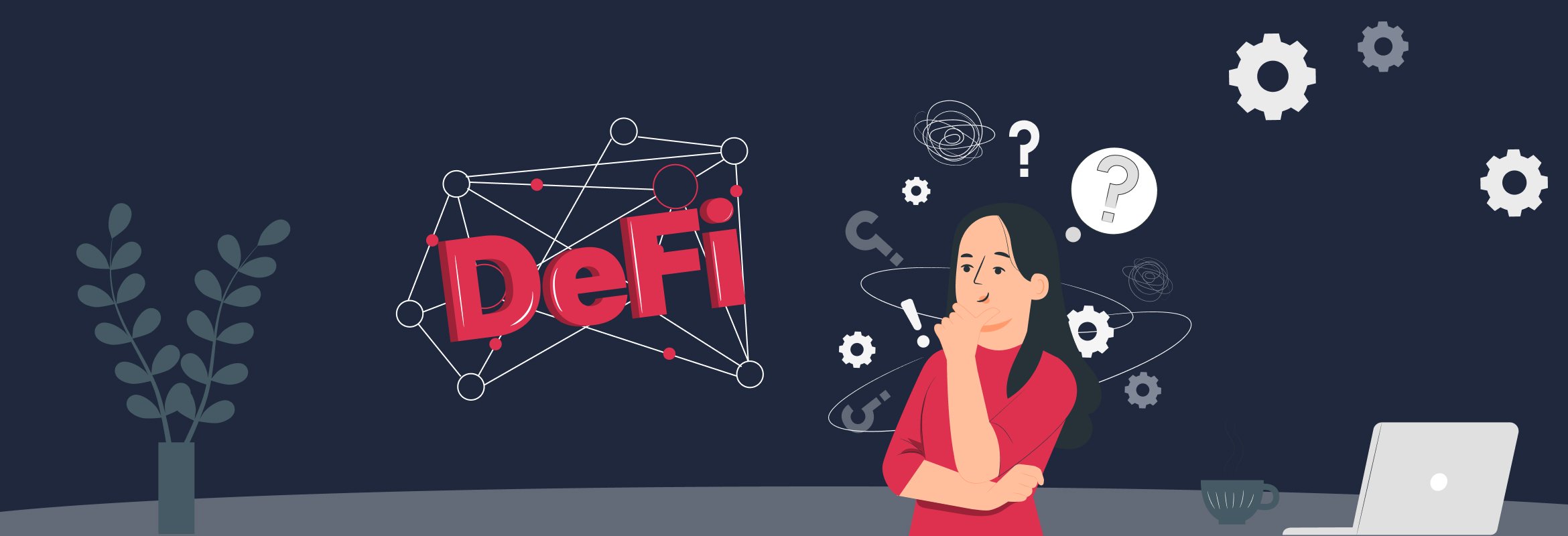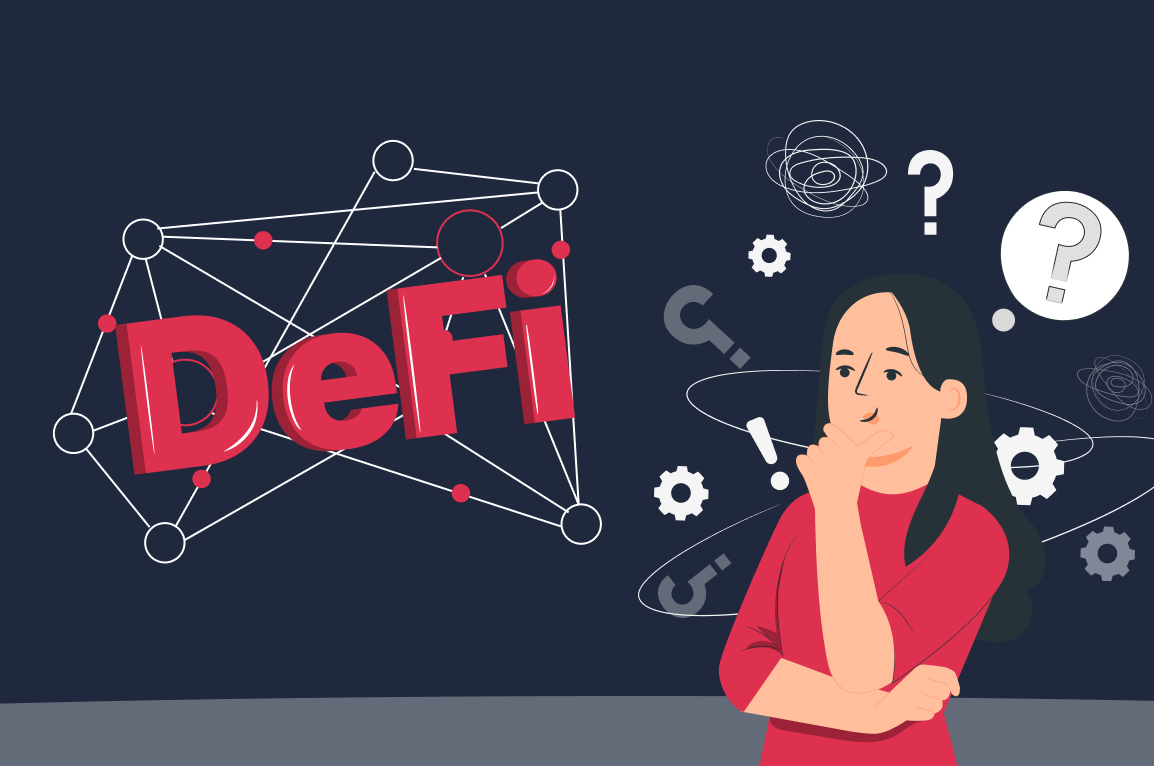Let’s talk
- Your message has been sent!
Dec 09, 2022 / Updated:Dec 16, 2022
Introduction
DeFi, the next wave of fintech innovation, often called fintech 2.0, has been capturing the attention of developers, users, investors, entrepreneurs, and others.
The ecosystem continues to evolve rapidly despite market ups and downs. Decentralized finance development is getting stronger with new solutions happening every day, and It's becoming harder to get up to speed. Let's dive deeper into DeFi to explore the sector along with its possibilities and benefits.
What Is Decentralized Finance
The creation of Bitcoin in 2009 changed the financial industry, while Ethereum and DeFi unlocked new possibilities that go beyond P2P transactions.
DeFi Definition
No matter what decentralized finance definition you use, it would be about change and transformation in the financial industry.
According to "How to DeFi" by CoinGecko, Decentralized Finance or DeFi is the movement that allows users to utilize financial services such as borrowing, lending, and trading without relying on centralized entities.
Starting to explain DeFi, we need to mention that compared to traditional finance (TradFi), it is programmable, open, and transparent. Products and activities in decentralized finance rely on blockchain technology and smart contracts. A smart contract is a self-executing program deployed on a blockchain network. It functions automatically according to predefined conditions without third-party intermediaries like banks. Developers build various DeFi applications on top of blockchain protocols that support smart contracts. The majority of DeFi services are built on the Ethereum blockchain. Among other leading smart contract platforms are Binance Smart Chain, Avalanche, Cronos, and others. Mainly, DeFi applications have governance tokens that allow community members to take part in various decisions so that the platform wouldn't depend on any key figures. The distribution of governance tokens is one of the major indicators showing how decentralized a platform is.
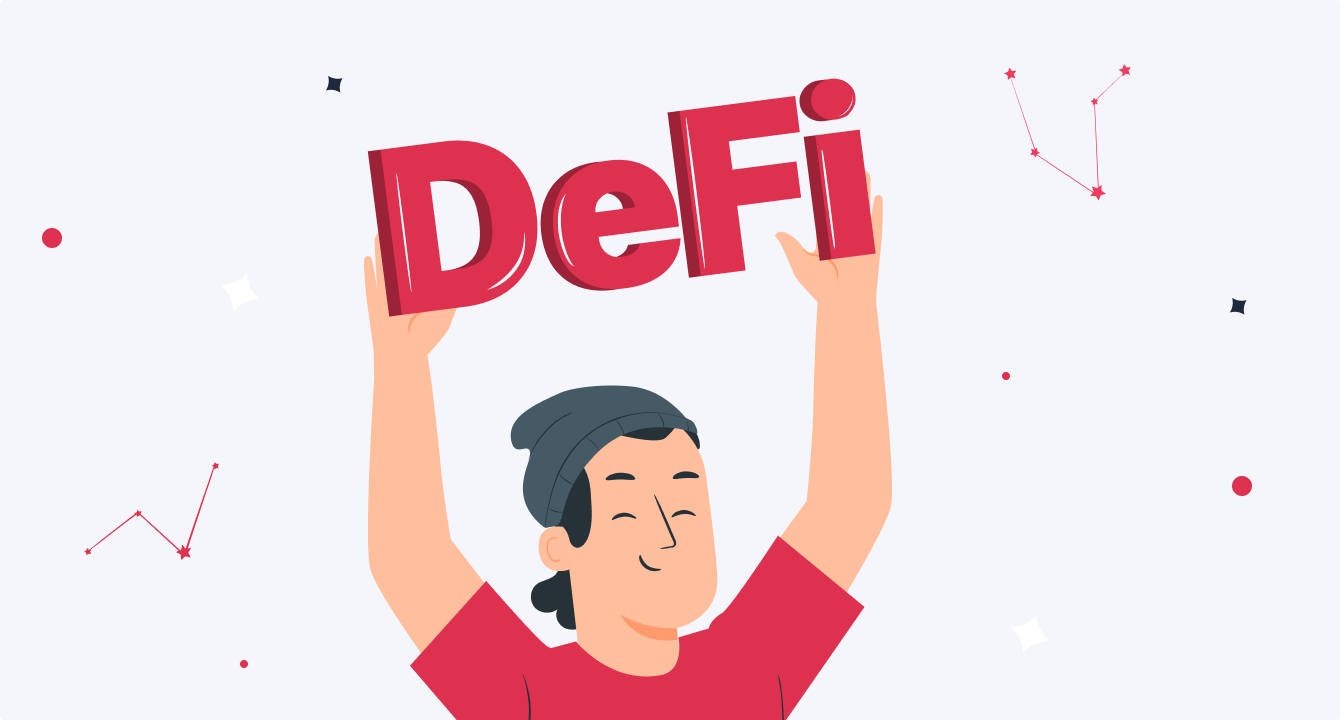
Types of DeFi Applications
The DeFi ecosystem consists of various applications that offer inclusive financial instruments and services. According to data provided by DeFi Llama, as of November 15, 2022, the total value locked in DeFi protocols stands above $43 billion.
Here are some of the most popular DeFi use cases:
Decentralized Exchanges
Decentralized Exchanges or DEXes are peer-to-peer platforms where crypto traders can make transactions directly, having full control over their funds. They allow users to trade or swap cryptocurrencies without requiring KYC (Know Your Customers). DEXes play an essential role in DeFi as they show the market's performance, including liquidity and the value of cryptocurrencies.
There are two popular types of DEXes:
- Order Book DEXes
Order-book-based DEXes function by recording bid orders and ask orders and matching them by buyers and sellers. Among popular order book DEXes are dYdX and Serum.
- Automated Market Makers (AMMs)
AMMs use liquidity pools instead of order books. Users swap tokens automatically through smart contracts, and algorithms determine token rates. Among popular AMMs are UniSwap, PancakeSwap, and others.
P2P Lending and Borrowing
Decentralized lending and borrowing platforms such as AAVE and Compound allow users to lend and borrow cryptocurrencies and earn income. Processes are transparent and secured by smart contracts and blockchain technology. Decentralized lending allows anyone to obtain loans without the need for a bank account or creditworthiness assessment. Users can borrow funds while providing collateral, lend funds to earn interest, or get loans instantly through flash loans. Lending platforms differ by the underlying technology, governance, loan options, interest rates, supported cryptocurrencies, and other features.
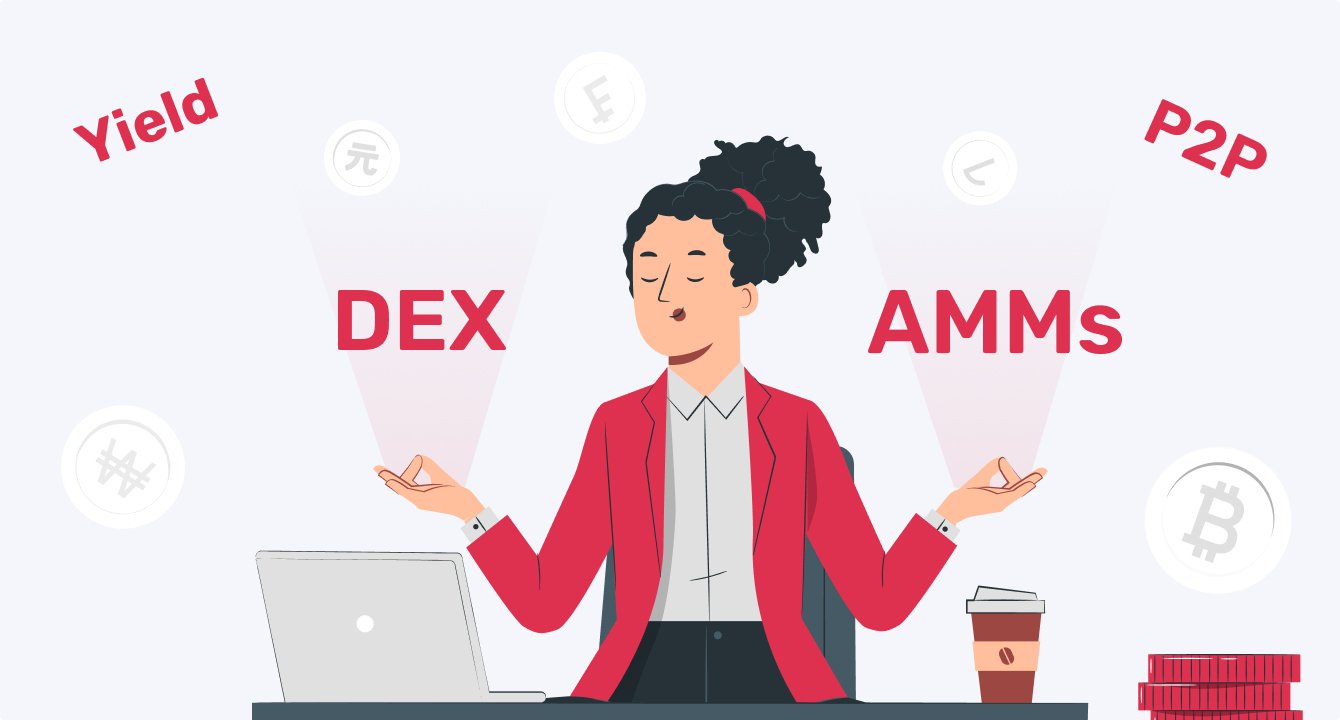
Derivatives
Derivatives are financial contracts whose value is based on a performance of an underlying asset or group of assets. Whether a trader will earn or lose money depends on a price change. A derivative can be based on the value of a stock, bond, market index, and more. Trading derivatives include new opportunities as well as risks. In DeFi, derivatives connect buyers and sellers directly due to the use of smart contracts. Values of DeFi derivatives can be based on cryptocurrencies, commodities, and traditional assets. There are different DeFi derivatives platforms, including dYdX and Synthetix.
Yield Farming
Yield farming is a popular DeFi activity through which traders put their cryptocurrencies into use to earn a return. It started in 2020 after the interest rate protocol Compound presented cTokens to allow users to lock their cryptocurrencies, receive cTokens in return and earn interest. Yield farmers practice different strategies to increase their profit, like moving their assets between various DeFi protocols or locking them in a smart contract to earn rewards. The concept of yield farming is to ensure the productive use of cryptocurrencies instead of just holding them in a wallet.
Liquidity Mining
Like yield farming, liquidity mining is a form of investing. However, the difference is that liquidity mining aims to attract liquidity to a certain DeFi protocol and provide users with the protocol's native token. Higher capital makes a protocol stronger, so various DeFi protocols offer liquidity mining programs to token holders to encourage their participation and attract new users. Liquidity mining is a win-win option for a decentralized finance protocol and a user. While a protocol will have the capital it needs to reward participants and offer services, liquidity providers will receive rewards. Users' reward percentage depends on the amount they provide to the liquidity.
Why Build Your Own DeFi App?
Blockchain development activity continues to hit new records. According to research by DappRadar, around 36% of all smart contracts ever published and confirmed on the blockchain occurred in 2022. This makes 118,000 smart contracts out of 323,700 that ever existed, which means that the interest in DeFi and other sectors is rising.
While customers are demanding alternatives to traditional financial services, DeFi is getting more competitive.
Joining DeFi in its early days will allow you to introduce users to a next-generation app and increase your profits. Start building a secure, user-friendly DeFi app that will help you create a strong customer base.
Want to be a part of the DeFi movement and create your next-gen application? Contact us!
With technical expertise and an agile development approach, Define will help you launch a competitive DeFi app in the shortest possible time.

Articles
-
 What Are Decentralized Exchanges? Meaning, Examples, and Benefits
What Are Decentralized Exchanges? Meaning, Examples, and Benefits
DEXes (short for decentralized exchanges) are places to trade cryptocurrencies, and they …
Jul 13, 2023
-
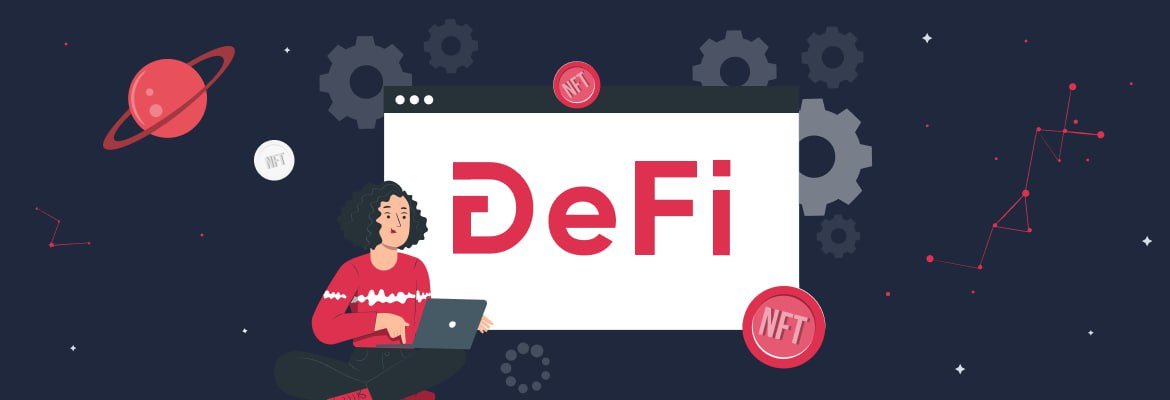 How Are NFTs Transforming DeFi
How Are NFTs Transforming DeFi
Say "blockchain and crypto," and Ethereum, NFTs, DeFi, and tokens will surely …
Jul 12, 2023
-
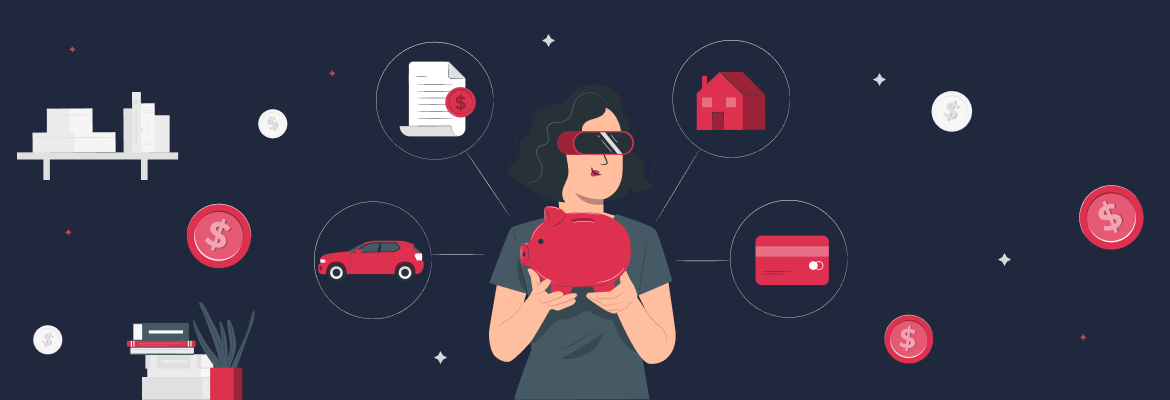 The Impact of the Metaverse on Banking and Finance
The Impact of the Metaverse on Banking and Finance
The metaverse has captured the attention of banks and financial institutions as …
Jun 15, 2023
